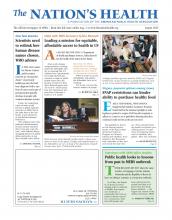The survival of children in cities around the world relies too much on the wealth of their families, according to a recent report.
“State of the World’s Mothers 2015: The Urban Disadvantage,” published by Save the Children on May 14, shows that although children in small towns and rural areas are surviving at a lower rate than those living in large cities, the findings do not show how income disparity affects child survival rates within urban areas.
“Our new report reveals a devastating child survival divide between the haves and have-nots, telling a tale of two cities among urban communities around the world, including the United States,” said Carolyn Miles, MBA, president and CEO of Save the Children, in a news release. “For babies born in the big city, it’s survival of the richest.”
The report included the Mother’s Index, a ranking based on the well-being of mothers and children in 179 countries. The index takes into account the risk of maternal death, the mortality rate of children under age 5, expected years of formal schooling, gross national income per capita and the level of participation women have in their governments.
The United States ranks 33rd among the 179 countries in the Mother’s Index. Compared to other developed countries, the United States does poorly on several indicators, the report found. The United States ranks 61st on maternal health and 89th on political status, which measures participation of women in national government. Women in the United States also face a “one in 1,800 risk of maternal death,” the worst performance of all the developing countries surveyed, according to the index.
According to the report, the poorest urban children are at least twice as likely to die as the wealthiest urban children in two-thirds of the surveyed countries. In almost half of the 40 developing nations surveyed, the gap between child survival rates in urban areas between the rich and poor has widened.
“Increasingly, our work is taking us into urban settings, where very poor, vulnerable mothers and children are dying at rates well above city or national averages,” Miles wrote in the report. “In most countries, the poorest urban children are at least twice as likely to die as the richest children before their fifth birthday. We call this the urban disadvantage.”
The report also showed some of the progress countries have made. Several cities cited in the report, including Addis Ababa, Ethiopia, and Manila, Philippines, have been successful in addressing the health needs of the poorest families. Miles said the cities, which have made improvements by raising health awareness, increasing access to health care and making health care more affordable, could serve as models for other countries.
“The survival of millions of children in cities should not be privilege for the rich, but guaranteed for all,” Miles said. “We must invest in making quality health care more accessible and affordable to all moms and babies.”
For more information on the report or index, visit www.savethechildren.org.
- Copyright The Nation’s Health, American Public Health Association









